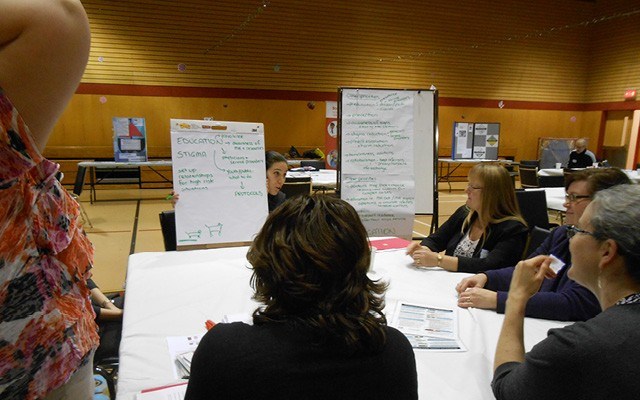High school can be a stressful time.
Between juggling a growing list of academic and social responsibilities, dealing with mounting pressure from teachers and parents, and effectively charting your post-secondary path, it can all get rather overwhelming.
That's what makes initiatives like Mental Health Week, running May 2 to 8, so essential, explained Christine Buttkus with the Sea to Sky Mental Health Partnership.
"Because there's still discomfort to some degree in talking about mental health, that's why weeks like this are so important," she said. "It helps us all be able to share if we're experiencing struggles and to find language to communicate what we're experiencing so that others can help us in finding support."
Members of the partnership, a multi-agency collective aimed at strengthening access, outcomes and community responsiveness to mental health issues in the corridor, will facilitate a range of interactive, educational activities for Whistler Secondary School students May 11 aimed at promoting healthy habits and positive-thinking skills.
"One of the things that's really exciting is listening to the feedback coming from students who have been exposed to the messaging and education we've been offering as a community," Buttkus said. "We're hearing from students who are now in Grade 12, for example, saying just what an impact it's had to hear first-person stories from individuals who have lived (with mental health issues) and are willing to share that."
Across the region, the group will also be following the Canadian Mental Health Association's theme for the week with posters and messaging centred around raising awareness of mental health in adults 65 and older.
Buttkus said a major year-round priority for the partnership is ensuring people are fully aware of the mental health resources and services on offer to them.
"One of the things that we saw when we did some consultation in 2014 was there was a real desire to raise awareness of the services that are available, and that's been part of our efforts and we continue to do that," she said. "We want people to get access to resources sooner and not wait and be struggling because they're not having conversations and therefore not finding services."
Locally, awareness doesn't seem to be as much a concern for the Whistler Community Services Society (WCSS) as it once was. The non-profit has seen a significant increase in people accessing its services. In 2010, for example, the society facilitated 500 one-on-one meetings with outreach workers, a number that is expected to top 2,000 this year.
"We are getting more well known and people are more familiar with what we do and who we are," explained WCSS outreach worker Ashlin Tipper. "Our service is extremely low barrier, so there's not a lot of paperwork, there's not a lot of red tape and we're pretty flexible with our schedule — I think our service is pretty unique that way. So I think people, for one, are feeling more comfortable reaching out, and two, are getting services they find beneficial."
But still there remain gaps in service.
"We don't have a mental health emergency team, or a crisis management team or anything like that for afterhours or weekends to support people in those crisis or immediate need situations," Tipper added. "As outreach workers and an outreach team, a lot of what we focus on is prevention in the community."
For more information on the range of services offered by WCSS, visit www.mywcss.org.




